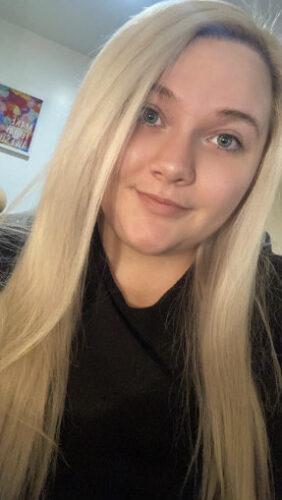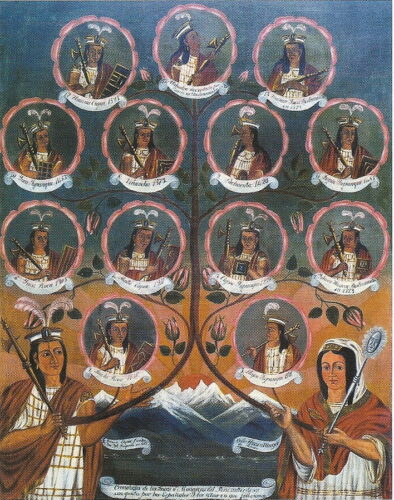
Mallory Dixon is a sophomore majoring in Secondary Social Studies Education and minoring in English at Indiana University of Pennsylvania. In the Fall 2022 term, she took an English 103: Accelerated Composition class, taught by Dr. Matt Vetter, and worked on the Wikipedia article “History of the Incas.” In the following essay, she reflects on that experience and argues for expanded uses of Wikipedia in higher education.
August, 2022. Before the semester started, when Professor Vetter emailed the class to let us know about the curriculum for the semester, I was very wary. I was not sure what to expect and was surprised a professor was teaching an entire semester on an encyclopedia all other teachers and professors have made us stay clear of. There is a lot that goes into deciding an answer to the question of where Wikipedia stands in higher education or if it has a place in higher education at all. Our whole educational path leading up to now has designed us to quickly respond that the answer to such a question is that Wikipedia belongs nowhere near higher education and that we should not use it at all. To this day, I still have professors mentioning the negative connotations of Wikipedia. Why is it that there is such a negative feeling toward Wikipedia that educators refuse to see the good things that can come from using it? After taking a composition course themed around writing in Wikipedia with Dr. Matt Vetter, I now feel that there is a lot of good that can come from using Wikipedia as a student. Although many educators and academic scholars believe that Wikipedia has no place in the academic world, I think there is a place at the table for it nonetheless, but an open mind to the uses it could provide is definitely necessary.
First and foremost, I think the elephant in the room for this topic is those who feel Wikipedia is not to be used at all and why they feel this way. One example of someone opposed to using Wikipedia in educational contexts is Todd Pettigrew. He discusses his thoughts on how Wikipedia is inappropriate to use as a teaching tool in The Case Against Wikipedia in the Classroom. Playing a bit of devil’s advocate, he has some decent points. One of those is that Wikipedia articles are not necessarily always well-written, which is a valid statement. The idea of anyone being able to draft an article is also something that steers educators away from Wikipedia. However, maybe educators do not realize how many people who write for Wikipedia are knowledgeable about the topics they write about. Some are even professionals in the topic area. These facts are covered up by the fact that high school students and even us as college students can add information to existing articles or create new articles too. Todd Pettigrew argues that he wants his students to read better writing than that, meaning better writing than high school students or beginner college students too. He also asserts that “students should learn how to build arguments, not write entries.”
I think Pettigrew is going about this the wrong way. Reading Wikipedia and learning to edit it as well could be extremely helpful and useful as a tool in someone’s back pocket. It is learning a new text genre and how to write for it as well. Basing the idea that you want students to read better writing than Wikipedia is a bit unrealistic. Pettigrew, and others who feel the same way, should look at it from another perspective. Educators should use the encyclopedia to teach students what could be fixed and why it is not well developed. It could be a good learning tool to look at Start or C-rated articles, for example, and to critique the writing in those articles in order to see how they could be improved to meet Wikipedia standards.
One of the essays we read that forwards a contrasting viewpoint to Pettigrew is James Purdy’s essay Wikipedia is Good for you!? Purdy discusses ways you can use Wikipedia as a base for how to do research-based writing. He is completely correct. This class on Wikipedia has taught me how to research and find reliable sources, create knowledge from those sources, and write it into an article. This is something that I think can be easily missed in English classes. Educators and students alike may not always understand that Wikipedia can be used for anything other than its content – the actual information you read in its articles. But Purdy proves that you can study how it’s written just as easily. I feel that Wikipedia is a good learning tool that we can use in schools. Educators should teach kids how to use it, how to edit it, and how to see which articles are fine-tuned and which need more development. Educating educators could be really helpful. One way to do this? Reaching out to professors and inviting them to classes or workshops for them to learn more positive ways of including Wikipedia in higher education. As someone who will be an educator once I graduate, I fully plan to utilize the things I have learned and talk to my own students about Wikipedia.
Another thing I would like to point out is the idea that these articles have a lot of academic resources and good resources that are used as sources for information. Looking at an article and using the sources they use to get more information for assignments and writing projects can be especially useful. Wikipedia does not need to be used as a citation, but take a look at the references section to see what citations are being used to build a Wikipedia article. In Alliana Drury’s essay Wikipedia’s Place in Higher Education, published previously on this website, she mentions the fact that at the bottom of every article is a list of credible sources. These are what make an article reliable and verifiable. Drury reminds us that “this is a good place to start for research” because you can use the heavy work someone else already did for finding credible sources and use them to your advantage. These are also checked by bots and people in Wikipedia to make sure they are reliable and credible sources.

Adding to my argument, some people consider the changeability of Wikipedia articles as a negative thing. I also disagree with that statement. Though I can see where they are coming from, I also understand Wikipedia’s ability to evolve as an opportunity. New information is discovered all the time leaving old articles and academic journals outdated and unusable. Wikipedia only takes one person to update an article and already it is good to go. For example, my article was on the history of the Incas. Academic journals gave me the information but what if something new was discovered and it changed so much? Maybe we deciphered something wrong or found new information through research done in Spanish-language publications. Those academic journals will need to be revised and will take so much time to get done and a new volume to be produced for the public. Wikipedia takes a few minutes of sourcing and entering new data and already it is up to date and ready for the public to see.
I really enjoyed doing the research and adding information to an article on Wikipedia. I think it taught me a lot about finding truly credible sources and making sure my writing was up to par. Deciphering credible vs. non-credible sources was difficult at first. What I thought looked good was not necessarily something that would be credible enough to stay on Wikipedia. I also chose a Start Class article knowing I had a lot more to work with when it came to adding to the article, which meant I had to do a lot more work with structure than some others.
The assignments leading up to publishing my version of the article were lengthy but also necessary. I think without really working step by step my article and research would not have been as effective. It really helped us slowly work our way to the big edit and publishing of our new content for the subjects. I do not know if I will edit again, but I like that I can go on and know how to find talk pages and the history and figure out what class the article is and how much work has been put into an article.
This was also a different audience than I have ever written for before. Usually, students will see something for a peer review but mostly the only person seeing my writing and effort was a professor and it was solely to grade and give feedback. This was a whole new ballpark. The audience is anyone in the world with access to a computer or phone and who has internet access. Learning to deal with that pressure and use it to better my content was something I do not think I will get to experience the same way again. Research papers are fairly common in college for certain subjects and as a Social Studies Education major with a minor in English, I am sure I will have plenty to do throughout college. This opportunity was still different. The genre was a new one for me and many students in the class as well. It was a learning curve that took time to get through but eventually we got there. The idea that someone else could read my content and gain more knowledge and use it to better understand something gives you a sense of gratification. I think there is also pride to be earned when something you added sticks and isn’t removed from the article.
Higher education could benefit by including classes like this one with Professor Vetter. I think that restricting students from thinking that Wikipedia doesn’t belong in higher education is more detrimental to their future. It feels small-minded to me; to assume there are no positive things about utilizing Wikipedia seems ridiculous. I can understand reservations about allowing it to be a source for a research paper. But professors need to acknowledge that you can get a wonderful foundation of knowledge on a topic by reading Wikipedia, and that by exploring an article’s references students can also learn to interact with different genres. Before this class, I am not sure I would have agreed with my own statements but learning, researching, writing, and using Wikipedia this semester opened my mind to other possibilities of use in the future.
Works Cited
Pettigrew, Todd. “The Case Against Wikipedia in the Classroom.” Maclean’s. Accessed 16 November 2022.
Purdy, James. “Wikipedia Is Good For You!?” Writing Spaces: Readings on Writing, Vol. 1, edited by. Charles Lowe and Pavel Zemliansky, Parlour Press, 2010. 205-224. Accessed 16 November 2022.
Drury, Alliana. “Wikipedia’s Place in Higher Education.” Wiki Education, 9 July 2019. Accessed 16 November 2022.
